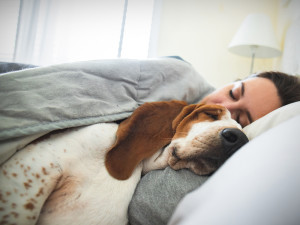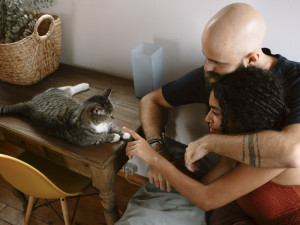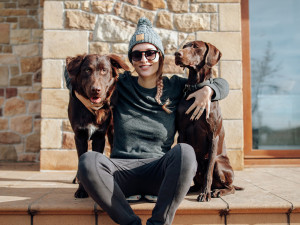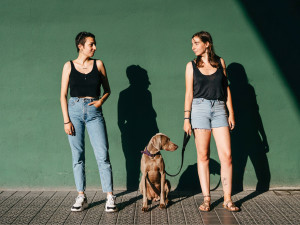How to Stop Your Dog From Ruining Your Sex Life
Expert advice on what to do when doggy style doesn’t mean what it used to.
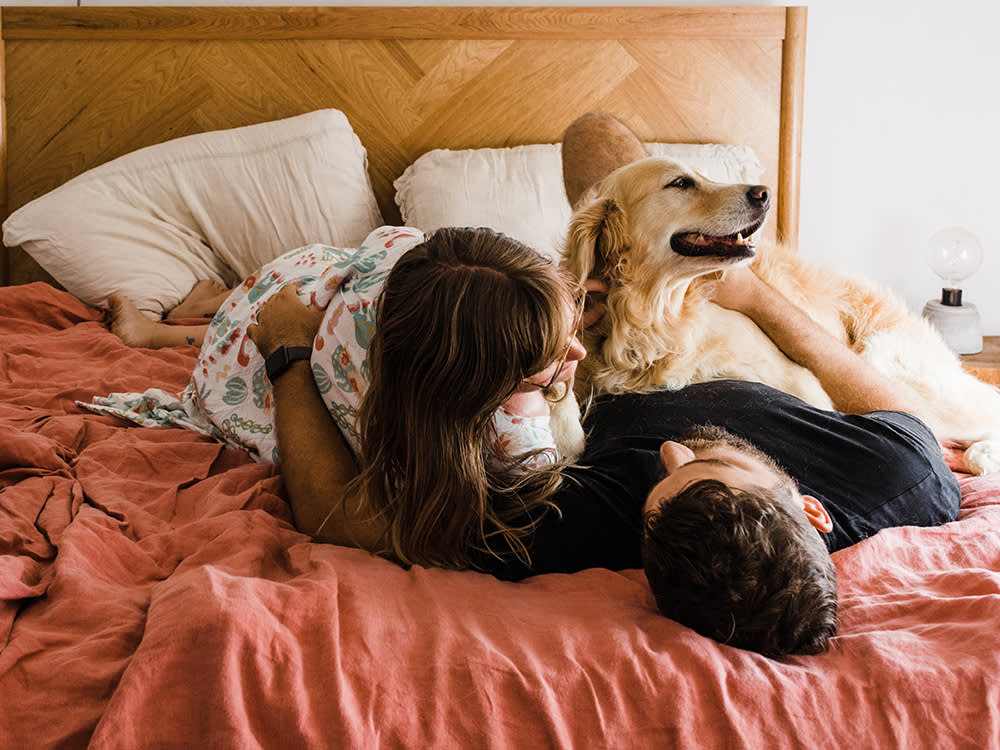
share article
Heavy Petting is a weekly column full of relationship advice for pet parents — so you and your boo don’t end up fighting like cats and dogs over the cat and dog.
Our dogs award us so much. They offer company when we’re lonely, companionship when we’re sad, and considerable amounts of social media content when we’re bored. However, there’s one thing they’re generally not willing to give us — privacy. As a society, there are a few things we hesitate to admit, such as questions about cryptocurrency, the fact that we still haven’t watched The Wire, and, of course, the impact that adopting a loving and adorably dependent dog can have on your sex life. Whether you’re in a committed relationshipopens in a new tab or playing the field, clingy or bed-obsessed pups can often be the largest hurdle to getting jiggy with it.
Let’s paint the scene — Marvin Gaye, candles, and a cheerfully slobbery dog smiling at the corner of the bed completely ignorant to what is about to happen, or rather what is trying to be done. It’s the ultimate mood killer, but you can take solace in the fact that it is far from uncommon. “This is something that I think people are embarrassed to talk about but happens more than one might expect,” says veterinary behaviorist Dr. Valli Parthasarathyopens in a new tab. We asked the expert why our pets are hellbent on preserving our celibacy and what solutions are available and, crucially, most effective.
Why dogs may try to ruin sex lives
There are a few reasons why our dogs may interrupt us in the bedroom, with two of the most common reasons being fear and curiosity. According to Dr. Parthasarathy, “There may be different sounds and movements than usual. This can be exciting for them and they want to be included, or it can also be scary for them and they want to know what is going on.” As we try to navigate which part of that sentence is more unsettling, she also notes it’s important to recognize that the dog is not doing this to be a pest and to not become angry or upset at them.
Another reason is simply that dogs are creatures of comfort and naturally gravitate towards the coziest option in the house. Regarding dogs that seem obsessed with getting on the bed, Dr. Parthasarathy explains, “Just like most people, many dogs enjoy being warm and comfortable when they sleep. This can become a preferred sleeping arrangement for dogs.”
Beyond that, some dogs are prone to separation anxiety — an issue that has very much been exacerbated during the last couple of years.opens in a new tab This is also the root cause of why they may cry if you leave them in another room — not to mention, it can be a bit cruel.
What to do about it
Great, now we know our dogs are interrupting our intimacy because they’re curious (ew), sad (aww), or afraid (fair). How do we make this less uncomfortable for everyone involved? The doc lays out a few strategies: Begin by encouraging other sleeping arrangements. Train your dog to enjoy comfy spots other than the bed. This is especially effective if you start early on in your time with them. Dr. Parthasarathy advises pet parents to decrease clinginess by encouraging their dogs to spend time away from them and rewarding independent playopens in a new tab.
If that doesn’t work, a diversion may be necessary. Find an interactive toyopens in a new tab that’ll occupy their time and attention. As Dr. Parthasarathy explains, “It may be possible to distract a dog — for a while, at least — if their people want some private time. Some options include providing a long-lasting food-stuffed interactive toy such as a Toppl (West Paw)opens in a new tab or other favorite chew item that will keep them occupied.” She also recommends using these tools as a means of training the dog to be calm in situations of intimacy.
In the scenario that neither of those work, your dog may be suffering from anxiety levels that require medicationopens in a new tab. According to Dr. Parthasarathy, “In situations where the dog is highly agitated, anxious, aggressive or fearful in these situations, behavioral medications that reduce anxiety and fear may be helpful.”
Last resort
Alright, real talk — if these strategies are unsuccessful, is it weird for the dog to stay in the room? Well, it’s unclear if the dog comprehends what’s going on, but that’s not exactly the issue here. “We don’t know if dogs actually comprehend what is going on if the humans in their home are being intimate. In most cases, it is probably fine for the dog to stay in the room during that time. That being said, if the dog is acting upset about their people being intimate then it should be addressed,” explains Dr. Parthasarathy.
Look, to each their own, but I doubt allowing the dog to stay is going to help make anyone less uncomfortable. For the rest of us (read: the sane ones), Dr. Parthasarathy has an easier solution. “If a dog is having a lot of difficulty both staying calm when in the room with their people, and also outside of the room, consider sending your dog to boarding or to a friend’s or family member’s house on ‘date night’.” And if that doesn’t work, it might be time you gave your dog the talk.
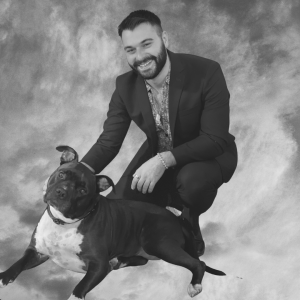
Sean Zucker
Sean Zucker is a writer whose work has been featured in Points In Case, The Daily Drunk, Posty, and WellWell. He has an adopted Pit Bull named Banshee whose work has been featured on the kitchen floor and whose behavioral issues rival his own.
Related articles
![Red haired woman in bright yellow sweater talking to her dark grey cat]() opens in a new tab
opens in a new tabWhat If You Hate Your Partner’s “Pet Voice”?
Or vice versa.
![Lesbian couple with a dog]() opens in a new tab
opens in a new tabWho Gets the Dog in a Breakup?
If the “Great Divorce” is coming, how should you handle custody battles and co-parenting your pet in a split?
![A couple smiling at their cat]() opens in a new tab
opens in a new tabLet’s Talk About Pets, Baby
We asked The Wildest readers hard-hitting relationship questions, and here’s what we learned.
